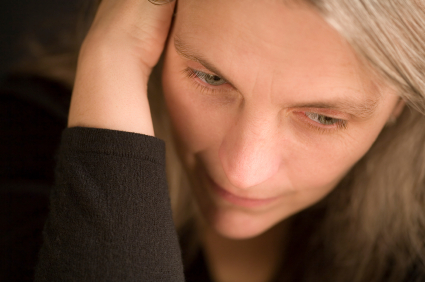Putting An End to Mood Swings
Ever go from perfectly normal mom, wife, daughter, friend or co-worker to the irritable, moody, crabby woman who is barely holding onto her sanity? Do you ever feel like this?
Suddenly, the weight of caring for children, husband, career and family, things you have lovingly managed for decades, becomes too much. This inability to handle the usual stressors catches us by surprise. What happened to the confident, calm, and even-tempered woman that used to be in control of her body?
Chances are: hormones happened or rather, the lack of hormones.
As we age, our hormones decline. In the case of the female hormones, estrogen and progesterone, progesterone declines at a much faster rate than estrogen, leaving many women with estrogen dominance. In addition, the use of birth control pills and the estrogenic effects of hormones in our meat and dairy products contribute to estrogen dominance. Imbalanced estrogen levels can actually induce anxiety and depression by causing functional hypothyroidism. Estrogen dominance can also be called progesterone deficiency, as what is needed to get the body back in balance is the addition of bioidentical progesterone.
Progesterone Improves Mood
Progesterone acts as a natural antidepressant, enhances mood and relieves anxiety. It also relieves postpartum depression, which is caused by the drastic drop in progesterone after childbirth. Research shows that progesterone showed a significant improvement in symptoms relating to tension, mood swings, irritability, and anxiety, and confirms the alleviation of some PMS symptoms relating to anxiety and irritability with progesterone. (1) Previous studies have shown that progesterone treatment in ovariectomized rats produces an anti-anxiety response similar to that observed after the administration of benzodiazepine compounds. (2) Progesterone produces a clear dose-dependent anti-anxiety response. These results demonstrate that progesterone shows the highest anti-anxiety potency when compared with all steroids evaluated. (3)
As women enter perimenopause, estrogen deficiency rears its ugly head. The characteristic symptoms of menopause such as hot flashes, night sweats, mood swings and insomnia begin to surface. The body is constantly readjusting to the changing hormone levels, thus causing a “swing” in moods.
Estrogen treatment of postmenopausal women has been shown to improve mood and psychological function. Study results suggest that estrogen use may improve the overall quality of life in postmenopausal women. (4) Research shows that increase in estradiol levels leads to a pleasant feeling of well-being and improved mood. (5) Research also demonstrates that depressive mood was decreased with estrogen therapy (6), and that tiredness, headache, tension and anxiety were significantly reduced following treatment with estrogen. (7)
The simple solution consists of evening out these swings by restoring your hormones to balance. Bioidentical estrogen must be balanced with bioidentical progesterone as they work in tandem. It’s simply a matter of putting back in what’s missing.
Dr. Hotze discusses the benefits of progesterone for anxiety:
Tired of any sign of irritability soliciting the comment, “Maybe it’s just your hormones.” Well, the truth is, maybe it is just your hormones.
Take our women’s symptom checker health quiz today to find out if hormones could be the cause of your mood swings.
Related Content
6 Ways Hormones Affect Your Mental Health
Do I Really Need Antidepressants for Hypothyroidism Symptoms?
Depression: Common Symptom of Hypothyroidism
Research
1. Efficacy of Progesterone Vaginal Suppositories in Alleviation of Nervous Symptoms in Patients with Premenstrual Syndrome
2. Anxiolytic Effect of Progesterone is Mediated by the Neurosteroid Allopregnanolone at Brain GABAA Receptors
3. Anti-Anxiety Effects of Progesterone and Some of its Reduced Metabolites: An Evaluation Using the Burying Behavior Test
4. Estrogen Improves Psychological Function in Asymptomatic Postmenopausal Women
5. Differential Effects of Exogenous Oestradiol and Progesterone on Mood in Post-Menopausal Women: Individual Dose/Effect Relationship
6. Estrogen Therapy for Depression in Postmenopausal Women
7. Psychophysiological Stress Responses in Postmenopausal Women Before and After Hormonal Replacement Therapy

